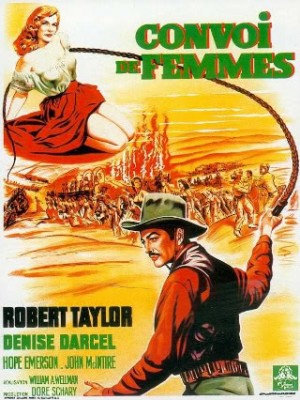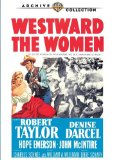| Reviews & Columns |
|
Reviews DVD TV on DVD Blu-ray 4K UHD International DVDs In Theaters Reviews by Studio Video Games Features Collector Series DVDs Easter Egg Database Interviews DVD Talk Radio Feature Articles Columns Anime Talk DVD Savant Horror DVDs The M.O.D. Squad Art House HD Talk Silent DVD
|
DVD Talk Forum |
|
|
| Resources |
|
DVD Price Search Customer Service #'s RCE Info Links |
|
Columns
|
|
|
Westward the Women
A Warner Archive Collection manufactured-on-demand release, Westward the Women looks like it might originally have been intended as a standard Warner Home Video DVD release, possibly as part of a larger boxed set, before the market for such product declined. Unlike virtually all Warner Archive releases, this one has several important extra features, including an audio commentary, and an unusual short promoting the film.
Based on a true story, the film opens in 1851 California, where prosperous rancher Roy E. Whitman (John McIntire), wanting to invest in his beloved valley's future, decides to bring good women from back east to marry and start families with his hard-working ranch hands. He hires experienced scout Buck Wyatt (Robert Taylor) to lead the ambitious wagon train, and after three months the two reach Chicago.
Whitman approves 140 of the candidates, even though very few have any practical experience driving mules or firing guns. They actually need about 100 women but, grimly, both Whitman and Buck expect a third will die along the way. Whitman refuses to take obvious prostitutes west, but allows French-born Fifi Danon (Dense Darcel) and Laurie Smith (Julie Bishop), who're obviously eager to quit the trade and start life over again.
Other women include Patience Hawley (Hope Emerson), the no-nonsense middle-aged widow of a New England sea captain; Mrs. Maroni (Renata Vanni), an Italian widow who speaks no English and who travels with her nine-year-old son, Antonio (Guido Martufi); Rose Meyers (Beverly Dennis), secretly pregnant with an illegitimate baby; and Maggie O'Malley (Lenore Lonergan), a farm girl and one of the few women who's a crack shot.
Buck hires 15 men to accompany them but their numbers dwindle quickly. He demands no fraternization with the women but they don't take him seriously until Laurie is raped and Buck coldly, unhesitatingly shoots dead the offender for all to see.
(Mild Spoilers) Early on in fact, all but four of the men defect, leaving only Buck, Whitman, and two others: Ito (Henry Nakamura) a diminutive (even by Japanese standards) but very capable Asian traveler, and a trail hand (Pat Conway?), who has fallen in love with Rose (Beverly Dennis), though they're keeping their feelings secret from Buck. When the men defect, a little less than halfway to California, Whitman assumes Buck will want to turn back but, partly to protect his own reputation, Buck insists on pressing forward, although that will mean the already exhausted women will have to work even harder.
Westward the Women is as remarkable as the women and their accomplishments. Though produced in 1951, near the peak of the Production Code's authority over edgy content, and by MGM, still the most conservative of film studios until producer Dore Schary took over, the film is brutal, unsentimental, and largely uncompromised. As if to show it means business, the first to die on the trail is loveable nine-year-old Antonio, who is killed when a gun he's loading apparently explodes in his face. Mrs. Maroni goes mad.
The picture holds little back in other ways. Darcel's reformed-yet-untamed prostitute is unusually authentic (Darcel herself became a stripper in the 1960s and exudes raw sensuality here) and her French profanity is véritable. How it got past the censors is a wonder. (Nakamura also speaks untranslated Japanese much of the time.)
More importantly, the film's depiction of these heroic women is never at all condescending in the usual Hollywood manner. Instead, most are simply inexperienced, but they adapt quickly and, in the film, realistically lose all pretense of glamour and are as sweaty and dirty as the men. A few complain but most do not. The actresses would, by and large, have been unfamiliar even to 1952 audiences - Taylor is the only real star - and this adds to the film's verisimilitude.
An early scene demonstrates this well. Buck, much less optimistic about the women's chances than Whitman, grills the candidates about their experience. "Who can handle a horse?" "No," he clarifies himself, "I mean really handle a horse?" A few women raise their hands. "Okay, who knows how to fire a gun?" Reasonably, only two out of the 140 women raises their hand but, when pressed to demonstrate their skill, they casually hit their target dead-on like seasoned gunfighters. Buck and Whitman are amused.
The film has very little underscoring, and the use of real but unfamiliar locations (apparently Arizona, Utah, and California) for the audience really creates an image of how agonizingly difficult wagon train life must have been like. In another scene a wagon is slowly lowered down an impossibly steep, boulder-filled mountainside. The carriage becomes loose and with its woman driver still inside, it crashes spectacularly at the bottom. One of the women screams at the awful sight, but all realize there's little to do but move on, and to get the next wagon in place.
Video & Audio
Westward the Women's transfer is a tad softer than I was expecting, but otherwise it's fine and completely acceptable. The region-free disc's Dolby Digital mono audio (English only), with no alternate language or subtitle options, is likewise fine.
Extra Features
Supplements include an informative audio commentary by film historian Scott Eyman, and an interesting 11-minute featurette released theatrically ahead of the movie's premiere, Challenge the Wilderness, which includes some great footage of the cast and Wellman during production. A trailer is also included.
Parting Thoughts
One of the great if less well-known early '50s Westerns, this can proudly stand alongside Winchester '73, Broken Arrow, High Noon, and The Gunfighter (among others) and comes Highly Recommended.
Stuart Galbraith IV is a Kyoto-based film historian whose work includes film history books, DVD and Blu-ray audio commentaries and special features. Visit Stuart's Cine Blogarama here.
|
| Popular Reviews |
| Sponsored Links |
|
|
| Sponsored Links |
|
|
| Release List | Reviews | Shop | Newsletter | Forum | DVD Giveaways | Blu-Ray | Advertise |
|
Copyright 2024 DVDTalk.com All Rights Reserved. Legal Info, Privacy Policy, Terms of Use,
Manage Preferences,
Your Privacy Choices | |||||||














